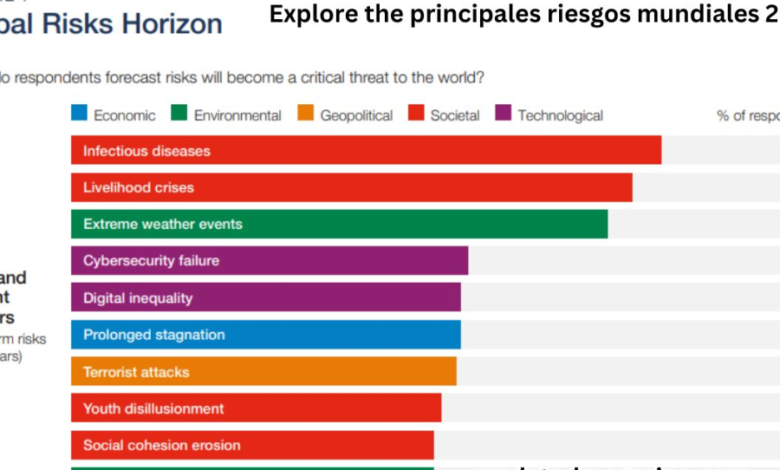Navigating the World’s Most Pressing Risks in 2021

As we traverse the landscape of 2021, it becomes evident that this year has brought forth a confluence of critical challenges spanning health, economic, geopolitical, environmental, and technological realms. The lingering effects of the COVID-19 pandemic, coupled with new and persistent threats, have shaped a complex and interconnected global risk environment. This article explores the multifaceted risks identified in 2021, offering insights into their implications and the strategies needed to address them.
The Persistent Impact of COVID-19
Despite initial hopes that 2021 would mark the end of the COVID-19 pandemic, the reality has proven to be more nuanced. The widespread rollout of vaccines has encountered numerous hurdles, including logistical challenges, supply chain disruptions, and varying levels of public acceptance. While some regions have made significant progress, others, particularly developing countries, continue to face limited vaccine access. This disparity has resulted in prolonged outbreaks and a slower return to normalcy. The uneven vaccine distribution has underscored the global inequalities in healthcare infrastructure, highlighting the need for coordinated international efforts to address these disparities and ensure equitable vaccine access.
Economic Repercussions of the Pandemic
The economic impact of the pandemic has been profound and far-reaching. Governments around the world have implemented unprecedented fiscal and monetary measures to cushion the blow, leading to increased public debt and budget deficits. Sectors such as tourism, hospitality, and retail have been particularly hard-hit, with many businesses struggling to survive. The accelerated shift to remote work and digital services has introduced both opportunities and challenges in the labor market. The risk of long-term economic scarring, especially for vulnerable populations and small businesses, remains a pressing concern. The pandemic has underscored the need for robust economic recovery plans and support mechanisms to aid those most affected.
Geopolitical Tensions and Shifting Alliances
US-China Relations
One of the most significant geopolitical risks of 2021 is the ongoing tension between the United States and China. This rivalry encompasses various domains, including trade, technology, and military influence. The Biden administration has signaled a commitment to addressing China’s growing assertiveness through multilateral cooperation and alliances. However, this approach presents complexities, as allies may have divergent interests and priorities. The potential for economic decoupling and technological bifurcation between the US and China poses substantial risks to global stability and economic integration. Navigating these tensions will require careful diplomacy and a balanced approach to international relations.
Middle East Instability
The Middle East remains a region fraught with geopolitical volatility. The economic impact of low oil prices, exacerbated by the pandemic, has strained the finances of oil-dependent economies such as Iraq and Algeria. Political instability and social unrest are likely to persist, with significant implications for regional security. Ongoing conflicts in Syria and Yemen, along with tensions between Iran and its neighbors, continue to pose risks to global energy markets and international security. Addressing these challenges will require sustained diplomatic efforts and regional cooperation to foster stability and promote peace.
Climate Change and Environmental Risks
Global Climate Commitments
Climate change has emerged as a critical global risk with extensive implications for economic stability, public health, and environmental sustainability. In 2021, major economies, including the European Union, China, and the United States, have committed to ambitious climate targets aimed at achieving carbon neutrality by mid-century. These commitments involve significant investments in renewable energy, sustainable infrastructure, and green technologies. However, the transition to a low-carbon economy presents challenges, including the need for substantial financial resources and the potential for socioeconomic disruptions. Effective policy frameworks and international cooperation are essential to advancing global climate action and ensuring a sustainable future.
Extreme Weather Events
The increasing frequency and intensity of extreme weather events, such as hurricanes, wildfires, and floods, underscore the urgency of addressing climate change. These events have devastating impacts on communities, economies, and ecosystems, leading to loss of life, displacement, and significant economic costs. Developing effective adaptation and resilience strategies is crucial to mitigating the impacts of climate change and protecting vulnerable populations. International collaboration and robust policy measures are necessary to address these challenges and build resilience against future environmental risks.
Technological Risks and Cybersecurity
Cyber Threats
The rapid digitization of economies and societies has heightened the risk of cyber threats. Cyberattacks on critical infrastructure, financial systems, and government institutions have become increasingly sophisticated and frequent. The proliferation of ransomware, data breaches, and cyber espionage poses significant risks to national security and economic stability. Strengthening cybersecurity measures, enhancing international cooperation, and fostering public-private partnerships are essential to addressing these evolving threats. Ensuring the security of digital infrastructure is crucial for maintaining trust and stability in an increasingly interconnected world.
Technological Disruptions
The accelerated adoption of emerging technologies, such as artificial intelligence, blockchain, and the Internet of Things (IoT), holds transformative potential but also introduces new risks. Issues related to data privacy, ethical considerations, and regulatory frameworks are critical to ensuring that technological advancements are leveraged for societal benefit. The potential for technological disruptions to exacerbate inequalities and displace jobs highlights the need for inclusive and forward-looking policies. Balancing innovation with responsible governance is essential to maximizing the benefits of emerging technologies while mitigating potential risks.
Conclusion
The global risks identified in 2021 reflect a complex and interconnected landscape where health, economic, geopolitical, environmental, and technological challenges converge. Addressing these risks requires coordinated and multi-faceted approaches that prioritize resilience, inclusivity, and sustainability. As the world continues to navigate the repercussions of the COVID-19 pandemic and other pressing threats, fostering international cooperation and leveraging innovation will be crucial to building a more secure and prosperous future. By understanding and addressing these risks, we can work towards creating a more resilient and equitable global community.
FAQs
What are the main global risks in 2021?
The main global risks in 2021 include the ongoing impact of COVID-19, economic repercussions, geopolitical tensions, climate change, and cybersecurity threats.
How has COVID-19 impacted global economies?
COVID-19 has led to economic disruptions, increased public debt, business closures, and accelerated digital transformation, with long-term scarring effects on vulnerable populations.
What are the key geopolitical tensions in 2021?
Key geopolitical tensions in 2021 involve US-China relations, Middle East instability, and shifting alliances in response to regional and global power dynamics.
Why is climate change a significant risk in 2021?
Climate change is a significant risk due to its far-reaching impacts on economic stability, public health, and environmental sustainability, with increasing extreme weather events highlighting the urgency for action.
How are cyber threats evolving in 2021?
Cyber threats in 2021 are becoming more sophisticated and frequent, targeting critical infrastructure, financial systems, and government institutions, necessitating enhanced cybersecurity measures and international cooperation.
What role do emerging technologies play in global risks?
Emerging technologies have transformative potential but also introduce risks related to data privacy, ethical considerations, and regulatory frameworks, requiring inclusive and forward-looking policies to ensure societal benefit.





